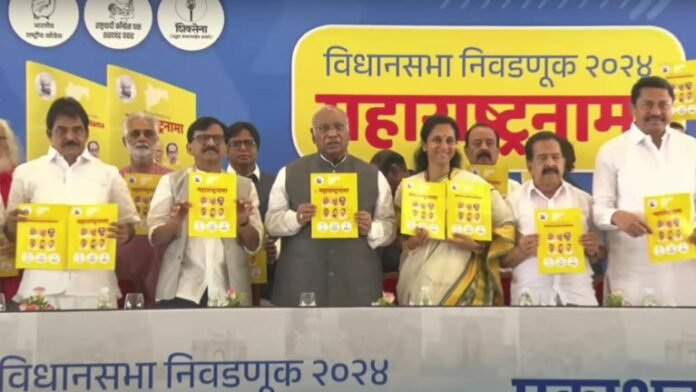The Maha Vikas Aghadi (MVA) alliance unveiled an ambitious manifesto promising a caste-based census, direct financial assistance for women, and a host of other progressive measures aimed at addressing social inequalities and improving public welfare. Mallikarjun Kharge, the President of the Indian National Congress, presented the manifesto in Mumbai alongside leaders from Shiv Sena (UBT) and the Nationalist Congress Party (NCP). The MVA, a coalition formed to challenge the ruling Bharatiya Janata Party (BJP)-Shiv Sena alliance in Maharashtra, aims to draw support across diverse voter demographics through these commitments, positioning itself as a champion for social justice and economic empowerment.
Key Proposals of the MVA Manifesto
1. Caste-Based Census
One of the most significant promises in the MVA manifesto is the implementation of a caste-based census in Maharashtra. The move aligns with the broader national debate on caste-based data and is intended to address the socio-economic disparities that continue to affect marginalized communities. Mallikarjun Kharge emphasized that the caste census would serve as a foundation for formulating targeted policies, which would more accurately address the needs of various social groups within Maharashtra.
Caste-based censuses have long been advocated by leaders who argue that accurate demographic data on caste can help assess economic disparities and develop equitable welfare policies. While India’s last official caste-based census was conducted in 1931, many states and political leaders have recently revived calls for an updated caste survey to understand the socio-economic status of historically marginalized groups. The MVA’s promise is likely to resonate with backward caste communities and could shift the electoral dynamics, especially as the state sees increasing demand for caste-sensitive policies.
2. Direct Financial Support for Women: Rs 3000 Monthly Stipend
The MVA manifesto also proposes a monthly stipend of Rs 3000 for women, aimed at fostering women’s economic empowerment and financial independence. This direct support initiative is designed to address income inequality and provide additional financial security to women across rural and urban areas in Maharashtra. In unveiling this proposal, Kharge noted that financial empowerment of women not only benefits families but also uplifts communities, encouraging increased participation of women in economic activities.
Financial assistance to women is a significant aspect of the manifesto that directly targets households and attempts to address economic hardships. With inflation and rising living costs affecting households, the MVA’s proposal promises to ease financial burdens. If implemented, this scheme could especially benefit women in low-income families and rural areas, where economic opportunities are limited. The promise aligns with similar welfare programs initiated by state governments in West Bengal, Tamil Nadu, and Delhi, which have seen positive responses from women voters.
3. Employment and Economic Reforms
To tackle the pressing issue of unemployment, the MVA has promised job creation across sectors and has proposed reforms to boost entrepreneurship, particularly among youth and women. The manifesto outlines policies to encourage small and medium enterprises (SMEs) through subsidies, loan support, and streamlined business regulations. Additionally, it proposes vocational training programs in rural areas to equip young people with skills relevant to the local job market.
The MVA’s focus on job creation and economic support for small businesses is seen as a response to Maharashtra’s current economic challenges, including unemployment and slow growth in key industries. By focusing on SMEs and self-employment, the MVA seeks to promote grassroots economic development, a key concern for voters in economically distressed regions of the state.
4. Improvements in Health and Education
Healthcare and education are central elements of the MVA manifesto, with commitments to expand access to quality healthcare services and improve educational infrastructure. The MVA has pledged to upgrade state hospitals, improve rural healthcare, and ensure affordable access to medicines and treatments. In education, the manifesto promises enhancements in school facilities, improved teacher training programs, and expanded scholarships for marginalized students.
Healthcare and education reforms are likely to appeal to voters across demographics, especially in rural areas where access to these services remains limited. The manifesto’s focus on healthcare and education also aligns with the MVA’s social justice agenda, reinforcing its commitment to providing equitable opportunities and services for all residents.
Political Implications and Voter Appeal
The MVA’s manifesto reflects a strategic emphasis on social justice, economic empowerment, and welfare-oriented policies. By proposing a caste census, the alliance is tapping into the growing call for caste-based data to inform policy-making, which could help the coalition consolidate support among backward caste groups and marginalized communities. The promise of direct financial support for women positions the MVA as a strong advocate for women’s empowerment, appealing to female voters who form a significant electoral base.
The alliance faces a tough battle against the BJP-Shiv Sena coalition, but by focusing on inclusivity and socio-economic reform, the MVA aims to draw diverse sections of the electorate, from rural communities to urban centers. As the campaign unfolds, the MVA’s promises will likely continue to generate debate, shaping the electoral discourse in Maharashtra. Ultimately, the manifesto seeks to convey the MVA’s commitment to social justice and empowerment, setting it apart from the ruling alliance in a bid to win the trust of Maharashtra’s voters.

